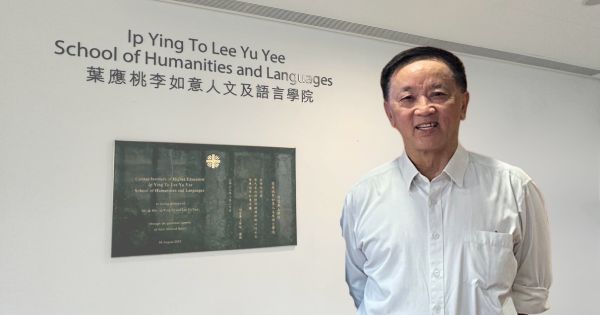Why AI can never erase the power of human translation
Last year, ChatGPT made a global impact and brought significant changes to the academic community in Hong Kong. Some universities even banned the use of related software. However, there were also higher education institutions that actively embraced new technologies.
Stay up-to-date with the latest cryptocurrency market trends and blockchain news and information by following CFTime page now.
The School of Humanities and Languages at Caritas Institute of Higher Education, for instance, established the world's second Center for Humanities and Technology in 2021, taking a leading role in promoting the integration of humanities and technology. Professor and Dr Chan Shin Wai from the School of Humanities and Languages at Caritas Institute of Higher Education, expressed in an interview with CFTime that technology is beneficial to any discipline, including language studies. He stated, "Our school aspires to become a world-leading institution in the field of humanities and technology!"
Caritas recently showcased its latest research achievements, including a Cantonese automatic football commentary system and a Chinese cuisine recipe image translation. Using the football commentary system as an example, Dr Chan mentioned that AI not only needs to track the movements of players on the field but also requires data on players' past performances and off-field information. One of the challenging aspects of commentary is how to handle the translation of foreign players' names, condensing lengthy names into concise translations within seconds. Dr Chan emphasized the importance of data, such as speech and textual data, in the development of the institute.
Dr Chan further explained that although machine translation has made significant progress, there is a need to develop gist translation and multimodal translation, which involves translating not only text but also images, sounds, and even 3D elements.
When asked about the potential impact of AI on the curriculum and the possibility of replacing human translators, Dr Chan stated that students need to possess the skills to manipulate and modify data, as it is crucial to understand how to use the information effectively. He emphasized the significant role humans play between machines and emphasized, "We cannot ignore the importance of human involvement."
Regarding whether machine translation will eventually replace human translators, Dr Chan explained that existing AI systems are based on past data and have limitations when encountering unknown information. He compared it to the COVID-19 pandemic, where pre-existing data was insufficient to handle the situation.
Dr Chan believes that in the past, translation studies in Hong Kong were predominantly focused on Chinese-English translation. However, with the city's aim to develop international trade, language proficiency is essential for effective communication. He expressed the willingness to collaborate with the government in this regard. Additionally, students should also be trained in major languages of the world, as the older generation of translators may not possess such skills.
Dr Chan acknowledged that Hong Kong is lagging behind in the integration of humanities and technology. He believes that students in the humanities field should receive training in technology. To address this, the institute offers a subject called "Computing Knowledge for Humanities Students" to familiarize students with computer-related knowledge as it is a growing trend.
Caritas Institute of Higher Education established the St. Francis Humanities and Technology Award in September 2021 to recognize individuals or organizations that have made outstanding contributions to the development of humanities and technology for the betterment of society. The institute also plans to publish the first encyclopedia on humanities and technology by the end of this year and organize an international conference next year. Dr Chan mentioned the collaboration with the School of Electronic Computing and Information Science to establish a translation and artificial intelligence program.
Regarding the future trends in translation studies, Dr Chan emphasized the importance for students to understand that many aspects have become technology-driven and that they need to be prepared for new training. The integration of technology, such as investments in laboratories and software, has also increased the training costs for students.
Dr Chan highlighted that their research team consists of over ten researchers, including four professors, all holding doctoral degrees. One of their goals is to promote Chinese culture using new technologies, and they plan to disclose more research findings to the public in the future.





